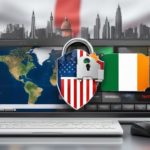As someone who values online privacy and security, you may have heard about Virtual Private Networks (VPNs) and their ability to keep you safe while browsing the internet. But how exactly does a VPN protect you? In this section, I will break down the various ways in which a VPN can safeguard your online activity and personal information.
First and foremost, a VPN provides a secure internet connection. By establishing a private network between your device and the internet, a VPN encrypts your data and ensures that only you and the VPN server can access it. This encryption process makes it virtually impossible for anyone to intercept and decipher your online activity, including your browsing history, messages, and passwords.
Furthermore, a VPN can also protect you from potential hackers and cybercriminals. By masking your IP address with the VPN server’s information, a VPN can prevent these attackers from tracking your online behavior and gaining access to your personal information and devices.
Overall, a VPN offers a comprehensive security package that can give you peace of mind when browsing the internet. But there’s much more to explore, so let’s dive deeper and learn more about VPN security measures and how they contribute to online privacy.
Key Takeaways:
- A VPN provides a secure internet connection that encrypts your data and makes it difficult for anyone to access it.
- A VPN can protect you from potential hackers and cybercriminals by masking your IP address and online activity.
- VPNs offer a comprehensive security package that can give you peace of mind when browsing the internet.
Ensuring Online Privacy
As more of our lives move online, it’s important to protect our personal information and online activity. This is where a VPN comes in, providing a secure and encrypted internet connection to safeguard your online privacy.
Data encryption is a core feature of VPNs, ensuring that any data you transmit online is scrambled and unreadable to anyone who intercepts it. This includes your internet service provider (ISP), which may track and sell your browsing history to advertisers without your consent.
A VPN also provides a secure internet connection, making it more difficult for hackers and cybercriminals to intercept your online activity and access your personal information. By routing your internet traffic through a remote server, a VPN masks your IP address and location, making it more difficult for anyone to track your online movements.
In addition to protecting your online privacy, a VPN can also bypass geo-restrictions, giving you access to region-locked content from anywhere in the world. This can be useful when travelling or accessing content that may not be available in your country.
Overall, a VPN provides a valuable layer of protection for online privacy and security. By using data encryption and providing a secure internet connection, a VPN ensures that your personal information and online activity remain private and secure.
Understanding VPN Basics
As I mentioned earlier, a VPN (Virtual Private Network) is a technology that establishes a secure internet connection between your device and the internet. This connection is encrypted, which means that any data transmitted between your device and the VPN server is scrambled and can only be deciphered with a key that is known only to the sender and the receiver.
The VPN creates a private network that effectively shields your online activity from prying eyes, be it your ISP, hackers, or government agencies. By connecting to a VPN server, all your internet traffic is routed through the VPN, making it appear as if you’re accessing the internet from the VPN’s location, not your own. This means that your IP address, which is a unique identifier for your device, is masked, providing an additional layer of privacy and security.
To establish a VPN connection, you need to have a VPN app installed on your device. When you open the app, you’ll be prompted to select a server location and connect. Once you’re connected to the VPN, your device will be assigned a new IP address, and all your online activity will be routed through the VPN’s server.
A secure internet connection provided by a VPN is an essential tool for protecting your online privacy and security. In the next section, we’ll dive deeper into the specific ways a VPN can help ensure online privacy and protect against potential cyber threats.
Protecting Confidential Information with a VPN
When browsing the internet, protecting confidential information is a top priority. A VPN can help ensure your sensitive data remains private and secure.
Data encryption is a key feature of VPNs that protects confidential information by scrambling it and making it unreadable to hackers or other unauthorized users. This prevents data breaches and ensures that your personal information, such as financial information or sensitive documents, remains confidential.
In addition to data encryption, a VPN can protect against hackers and cybercriminals. By establishing a secure internet connection, a VPN prevents unauthorized access and provides an additional layer of security. This is particularly important when using public Wi-Fi networks, which are vulnerable to attacks from hackers.
In summary, data encryption and protection against hackers are two key features of VPNs that help protect confidential information. By using a VPN, you can ensure that your sensitive data remains private and secure, even when browsing the internet on unsecured networks.
Anonymous Browsing with a VPN
One of the key benefits of using a VPN is the ability to browse the internet anonymously. This can help protect you from identity theft and keep your online activities private.
When you connect to a VPN, your internet traffic is routed through a secure, encrypted tunnel. This means that your IP address is hidden, preventing websites and online services from tracking your location and online behavior.
Without a VPN, your internet service provider (ISP) can monitor your online activity and potentially sell your browsing data to advertisers or other third parties. This exposes you to the risk of identity theft and can compromise your online privacy.
By using a VPN, you can enjoy the benefits of anonymous browsing and protect your personal information from prying eyes.
VPNs and Public Wi-Fi
Connecting to a public Wi-Fi network can be a convenient way to access the internet when you’re on the go, but it also poses significant risks to your online privacy and security. When you connect to an unsecured public Wi-Fi network, hackers and cybercriminals can easily intercept your internet traffic and gain access to your personal information, such as login credentials or financial data.
To safeguard your online privacy and secure your internet connection when using public Wi-Fi, it’s essential to use a VPN. A VPN can encrypt your internet traffic, making it nearly impossible for anyone to intercept or decode. It also hides your IP address and location, further enhancing your privacy and preventing potential attacks from hackers.
Choosing the Right VPN for Public Wi-Fi Use
When selecting a VPN for public Wi-Fi use, it’s important to choose a provider that offers strong encryption protocols and security features. Look for a VPN that uses AES-256 encryption, as this is one of the most secure encryption methods currently available. A VPN that offers additional security features, such as a kill switch or malware protection, can also provide an extra layer of protection against potential attacks.
Another factor to consider when choosing a VPN for public Wi-Fi use is the provider’s commitment to online privacy. Look for a VPN that has a strict no-logging policy and is located in a privacy-friendly jurisdiction. This can help ensure that your personal information is not collected or shared with third parties without your consent.
Best Practices for Using a VPN on Public Wi-Fi
In addition to choosing the right VPN provider, there are several best practices you should follow when using a VPN on public Wi-Fi. First, make sure you keep your VPN software and operating system up to date, as this can help protect against security vulnerabilities and bugs.
It’s also essential to use strong, unique passwords for all your online accounts, especially when accessing them over public Wi-Fi. Consider using a password manager to create and store complex passwords securely.
Lastly, be cautious when browsing the internet or downloading files over public Wi-Fi. Avoid accessing sensitive information, such as online banking or shopping accounts, and be wary of suspicious websites or downloads that could contain malware or other threats.
Choosing the Right VPN Provider
When selecting a VPN provider, it’s important to consider various factors to ensure VPN security and online privacy. One of the key features to look for is data encryption. A VPN that uses strong encryption protocols will make it difficult for hackers to intercept your data and breach your online security. Look for a VPN that offers AES-256 encryption, which is currently the strongest and most secure encryption available.
Another important factor to consider is the VPN provider’s reputation. Choose a provider with a good track record in providing reliable and secure VPN services. Read reviews and customer feedback to get a sense of the provider’s reliability, quality of service, and commitment to online privacy.
It’s also essential to ensure that the VPN provider respects your right to online privacy and does not log your activity while connected to their service. A good VPN provider will have a transparent privacy policy and will not collect or share your personal information.
Finally, consider the VPN provider’s customer support options and availability. VPNs can sometimes experience technical issues, so it’s important to choose a provider with knowledgeable and responsive customer support.
VPNs for Different Devices
It’s essential to secure each device you use to connect to the internet with a VPN to protect your online privacy and secure your internet connection, no matter what device or operating system (OS) you’re using.
Most reliable VPN providers offer apps for common devices such as computers, smartphones, and tablets with different OSs.
For computers running Windows, Apple macOS, or Linux, you can download and install a VPN app or configure VPN settings manually. For smartphones and tablets, VPN apps are available for iOS and Android devices, which you can download from the App Store or Google Play Store.
When using a VPN on mobile devices, you’ll have to choose between using a mobile VPN app or manually configuring VPN settings on the device. It’s usually easier to use a mobile VPN app as it automatically configures the settings as per your device requirements.
VPNs are also available for other devices such as routers, gaming consoles, and smart TVs. While configuring a VPN on these devices can be a bit complicated, it’s worth it as it provides a secure internet connection and protects from identity theft.
Conclusion
Securing each device you use to connect to the internet with a VPN is crucial. Whether you’re using a computer, smartphone, tablet, or other devices, the VPN app will provide you with a secure internet connection and protect your online privacy, preventing identity theft and other online threats.
VPNs and Geo-Restrictions
One of the great benefits of using a VPN is the ability to bypass geo-restrictions and access region-locked content. By connecting to a VPN server in a different country, you can appear as if you’re accessing the internet from that location, allowing you to access content that may be restricted in your own country.
Additionally, using a VPN can enhance your online privacy by masking your IP address and location. This added layer of anonymity can help protect your online activities from prying eyes, including your internet service provider and potential hackers.
It’s important to note, however, that bypassing geo-restrictions using a VPN may still be against the terms of service of certain websites or streaming services. Always check their policies before accessing content through a VPN.
VPNs for Business Use
When it comes to protecting confidential information, VPNs are a crucial tool for businesses. By using a VPN, companies can encrypt data and create secure remote connections that protect sensitive information from cybercriminals. This is especially important for businesses that handle financial data, customer information, or other sensitive data.
When selecting a VPN provider for business use, it’s important to choose one that offers strong VPN security features. Look for a VPN that uses the latest encryption protocols, such as AES-256, and has a reputation for reliable service. A good VPN provider should also offer 24/7 customer support, so that any issues can be addressed promptly.
Another benefit of using a VPN for business is that it enables employees to securely access company networks from remote locations. This allows for more flexible working arrangements and can increase productivity. However, it’s important to establish clear policies and guidelines for VPN use to maintain security and prevent any data breaches.
In summary, VPNs are an essential tool for businesses that handle confidential information. By using a VPN, companies can protect sensitive data and create secure remote connections that enable flexible working arrangements. When selecting a VPN provider for business use, look for one that offers strong VPN security features and reliable service.
Staying Safe with a VPN – Best Practices
When it comes to using a VPN, there are certain best practices you should follow to ensure maximum security and online privacy. By doing so, you can protect yourself against potential attacks from hackers and other malicious actors.
Choose a reputable VPN provider: Look for a provider that has a strong reputation for VPN security and privacy. Research the encryption methods they use and make sure they are up to date.
Use strong encryption protocols: Make sure your VPN uses encryption protocols like AES-256 which is currently the industry standard and has not been successfully compromised.
Update VPN software regularly: Keep your VPN software up to date to make sure it has the latest security patches. Set your VPN software to automatically update, so you don’t have to worry about manually updating it.
Avoid suspicious websites and downloads: Stay away from suspicious websites and downloads that may contain malware or viruses. A VPN can protect you, but it’s best to avoid risky behavior altogether.
Use two-factor authentication: Consider adding an extra layer of security by enabling two-factor authentication on your VPN account. This will require a second form of identification in addition to your password, making it more difficult for hackers to access your account.
By following these best practices, you can use a VPN with confidence and enjoy a safer and more private online experience.
Conclusion
In conclusion, using a VPN is an essential tool for protecting your online privacy and security. By encrypting your data and providing a secure internet connection, a VPN can help safeguard your personal information from hackers, cybercriminals, and other online threats.
When choosing a VPN provider, it’s important to consider factors such as the level of security offered, the provider’s reputation, and their commitment to protecting your online privacy. By selecting a reliable VPN provider, you can ensure that your online activity is kept confidential and secure.
Remember, using a VPN can also help bypass geo-restrictions and provide access to region-locked content. Whether you’re using it for personal or business purposes, a VPN is a valuable tool in maintaining privacy and security online.
Stay Safe with a VPN
Following best practices when using a VPN can help maximize security and online privacy. Some tips to keep in mind include choosing strong encryption protocols, regularly updating your VPN software, and avoiding suspicious websites and downloads. By staying vigilant and taking proactive measures, you can enjoy a safer and more private online experience.
FAQ
Q: How does a VPN protect you?
A: A VPN protects you by encrypting your internet connection and routing it through a secure server. This helps to hide your IP address, making it difficult for anyone to track your online activities or intercept your data.
Q: How does a VPN ensure online privacy?
A: By encrypting your internet traffic, a VPN ensures that your online activities remain private. It prevents your ISP, government agencies, or hackers from accessing your personal information and browsing history.
Q: What is a VPN and how does it work?
A: A VPN, or Virtual Private Network, is a technology that creates a secure and private network connection over the internet. It works by establishing a tunnel between your device and a VPN server, encrypting your data and routing it through the server to protect your online activities.
Q: How does a VPN protect confidential information?
A: A VPN protects confidential information by encrypting it before transmitting it over the internet. This ensures that even if someone intercepts the data, they won’t be able to read or access it without the encryption key.
Q: How does a VPN provide anonymous browsing?
A: A VPN provides anonymous browsing by masking your IP address and replacing it with the IP address of the VPN server. This makes it difficult for websites, advertisers, or anyone else to track your online activities and link them back to your true identity.
Q: Why is using a VPN important when connecting to public Wi-Fi?
A: Public Wi-Fi networks are often unsecured, making them vulnerable to hackers. By using a VPN when connecting to public Wi-Fi, you create a secure and encrypted connection, protecting your data from potential attacks.
Q: What should I consider when choosing a VPN provider?
A: When choosing a VPN provider, consider factors such as their security features (encryption protocols, no-logs policy), reputation in the industry, server locations, and ease of use. It’s important to choose a reputable provider that prioritizes your online privacy.
Q: Can I use a VPN on different devices?
A: Yes, VPNs can be used on various devices, including computers, smartphones, and tablets. Most VPN providers offer apps or software that can be easily installed on different devices for secure internet connections.
Q: How can a VPN bypass geo-restrictions?
A: A VPN can bypass geo-restrictions by rerouting your internet connection through a server located in a different country. This makes it appear as if you are accessing the internet from that country, allowing you to access region-locked content.
Q: Why are VPNs important for business use?
A: VPNs are important for business use because they provide secure remote access for employees, protect confidential business information, and maintain privacy when connecting to company networks. They help safeguard sensitive data and maintain a secure digital infrastructure.
Q: What are some best practices for using a VPN?
A: Some best practices for using a VPN include choosing strong encryption protocols, regularly updating your VPN software, avoiding suspicious websites or downloads, and using unique and strong passwords for your VPN account.








